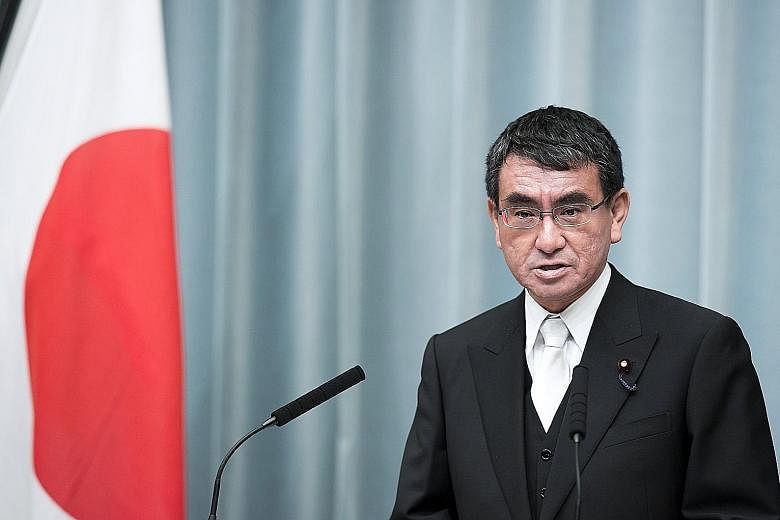Japan's new chief diplomat Taro Kono is a political blueblood who does not want to live in his father's shadows.
"I want to build a good international reputation by being myself, or Foreign Minister Taro Kono," the 53-year-old said last Friday, referring to the inevitable comparisons with his father Yohei.
The younger Mr Kono, known to be a reform-minded left-leaning advocate within the conservative Liberal Democratic Party (LDP), also stressed: "I'm completely different from my father in terms of personality and thinking."
The elder Mr Kono was a political heavyweight who served as foreign minister twice - from 1994 to 1996 and then from 1999 to 2001. He was also chief cabinet secretary and at one point, president of LDP though he was never prime minister.
He is best known for delivering the landmark 1993 apology - dubbed the Kono Statement - to wartime "comfort women", a euphemism for sex slaves, noting that their employment caused "immeasurable pain and incurable physical and psychological wounds".
The younger Mr Kono, who in 2002 donated part of his liver to his father who was suffering from cirrhosis, is a seven-term LDP lawmaker who is married with one son.
Fluent in English, he was taught by US secretary of state Madeleine Albright at Georgetown University and has worked as an aide for several US politicians.
He is thus seen as an asset as Japan strives to foster a closer alliance with the United States at a time of regional volatility.
The younger Mr Kono, too, has ties with Singapore, where he worked for about two years with Fuji Xerox's international business division before he became a politician.
In 1999, he contributed an opinion piece to The Straits Times urging reforms of Japan's contribution to the United Nations Security Council, at the time saying that the country was "getting a raw deal" as its voice could "barely be heard within the UN" after it lost its non-permanent seat.
As a politician, he formerly served in roles such as senior vice-justice minister as well as multimedia chief for the LDP where he has embraced the use of social networking sites such as YouTube.
On policy matters, Mr Kono has diverged from the LDP on issues such as nuclear and immigration.
He has vehemently opposed the restart or the construction of nuclear reactors, and has also called for Japan to welcome more blue-collar foreign workers given the nation's labour shortage.
And as a political aspirant, he ruffled feathers when he said some elder lawmakers ought to step down to rejuvenate the party while campaigning for the LDP leadership election in 2009. Former finance minister Sadakazu Tanigaki beat him in that race.
But the new foreign minister is aligned with the LDP's views on historical issues, and has upheld Tokyo's 2015 comfort women pact with Seoul despite calls from South Korea for it to be revised.
Walter Sim


